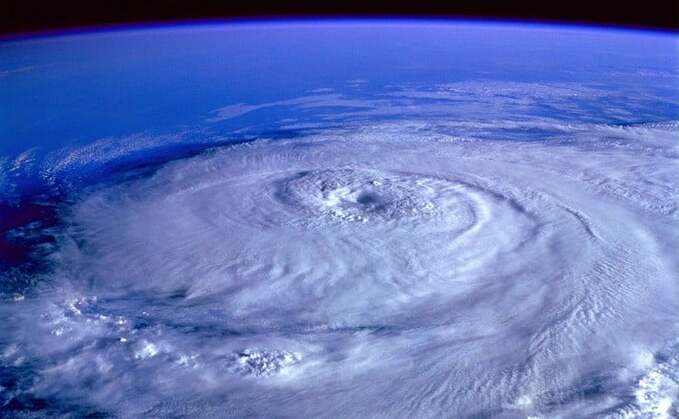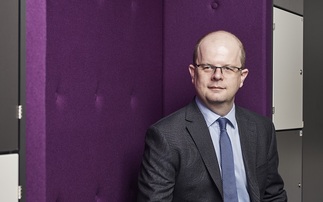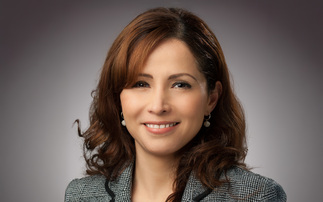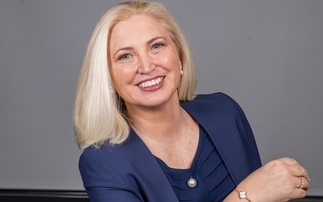
Stuart Kirk's insistence investors do not need to worry about climate risk fundamentally misunderstands both climate change and risk.
The first thing to say about this week's explosively contrarian speech from Stuart Kirk, global head of responsible investing at HSBC Asset Management, on "why investors need not worry about climate risk" is that this is not really about Stuart Kirk.
The sneering impressions of environmental campaigners may have been all his own work, but the argument he espoused is one shared by many investors and top executives. It is an open secret that while concerns over climate risks and the net zero transition have forced their way into the corporate mainstream securing plenty of genuine support along the way, there is a rump of traditionalist business leaders, often to be found in the world of finance and the most carbon intensive industries, who concur with Kirk's hot mess of climate denialist talking points.
His speech to the Financial Times' Moral Money event on 19 May was essentially a financiers' reworking of the 'let's just adapt' to climate change argument the likes of Bjorn Lomborg and Matt Ridley have been pedalling for over a decade. It was basically a Spectator column with extra charts.
However, the lack of original analysis does not make this argument any less dangerous. The fundamental misunderstanding of climate risks demonstrated by the global head of responsible investing at HSBC, coupled with his willingness to try and lay some of the blame for the current economic crunch at the door of excessively onerous climate regulations highlights how critics of the net zero transition hope to exploit the cost-of-living crisis to delay and dilute climate action.
As such, it is worth unpacking Kirk's argument so as to reveal the many simplicities and fallacies that underpin his assertion that the world will definitely "cope" with climate impacts and economic growth will confidently continue at historic 20th century rates deep into the 22nd century. Or, to put it another way, to give the whole thing a right good fisking.
Kirk starts by claiming that his "one sop to responsible investing" is that he has a beard, which immediately raises questions about the recruitment process at HSBC given he is, and this is crucial to remember, the global head of responsible investing at HSBC Asset Management.
He adds that he is probably "the only head of responsible investing who has never used the word journey", which is in fairness a pretty good joke.
Kirk's opening contention is that unlike many of his peers he takes "a very financial and investment view of the topic". But it is here that things start to go wrong, because a "financial and investment view" of climate risk should still incorporate the very risks Kirk insists we should not worry about.
"Climate change is not a financial risk that we need to worry about," he continues. "Heresy!" It is hard to escape the impression throughout that Kirk is enjoying the role of heretic, but that should not distract from the implications contained in that wilfully provocative statement.
The overarching argument is that warming of circa 2C to 3C - warming that the most peer-reviewed scientific assessment in human history predicts would lead to sea level rise, sharply reduced agricultural yields, deadly heatwaves and wildfires, desertification, coral reef die-off, increased disease risk, mass migration, conflict, and potential carbon sink tipping points - is "not a financial risk that we need to worry about".
Now it is true that humanity might find ways to mitigate and adapt to these impacts. Kirk is right to argue that we have a remarkable track record of resilience and ingenuity. But if you cannot see how such substantial and interlocking impacts could present a financial risk that is worth considering you should arguably not be left to handle scissors unsupervised, let alone manage millions of pounds of other people's money.
Kirk insists his downplaying of such risks is justified because other catastrophic risks have not come to pass. Or, as he puts it, throughout his financial career there has always been "some nutjob telling me about the end of the world".
Leaving aside whether or not pretty much the entire scientific, political, and financial establishment is populated by "nutjobs", Kirk is guilty of a long-standing error about the nature of risk. As the famous disclaimer has it, "past performance is not indicative of future results". At the end of the Boy Who Cries Wolf, there is a wolf.
The example Kirk uses to justify his insouciance is also revealing. Remember Y2K, he asks, implying that concerns about digital disaster were overblown because "the lifts didn't stop". But as is widely understood across the tech industry, the risks presented by Y2K were severe and crisis was only averted thanks to considerable investment and comprehensive forward planning. As Paul Saffo, a futurist and adjunct professor at Stanford University, told Time magazine for a feature to mark the 20th anniversary of the Y2K panic: "The Y2K crisis didn't happen precisely because people started preparing for it over a decade in advance."
However, what really bothers Kirk about climate risk is not that people are worried about it unnecessarily. His frustration stems from "the amount of work these people make me do". His chief complaint is that huge numbers of people on his team are "being asked to look at something that is going to happen in 20 and 30 years hence" at a time when they also have to deal with crypto, US regulators, China, a looming housing crisis, and soaring inflation. "The proportionality is completely out of whack," he argues. It is a theme he returns to at the close of his speech imploring regulators to "show some perspective" given "markets are crashing around our ears today for nothing to do with climate whatsoever".
It is a seductive argument and one that could gain considerable traction as households face inflation approaching 10 per cent and geopolitical tensions continue to ratchet upwards. But the central assumption - "markets are crashing around our ears today for nothing to do with climate whatsoever" - does not stand up to even the most cursory scrutiny.
First up, try telling farmers in India and Pakistan baking in 50C heat that climate risks are 20 and 30 years hence. This week the World Meteorological Organisation published a report detailing how four key climate change indicators - greenhouse gas concentrations, sea level rise, ocean heat, and ocean acidification - all set new records in 2021. "This is yet another clear sign that human activities are causing planetary scale changes on land, in the ocean, and in the atmosphere, with harmful and long-lasting ramifications for sustainable development and ecosystems," the agency said.
Secondly, there are many interlocking factors behind the current economic pressures, but if you can't see that climate related risks are in the mix then you are not looking hard enough. The primary trigger for the current economic crisis is a war waged by a petrostate. That war has led to surging energy costs, which would be considerably less of a problem if governments had introduced more ambitious energy efficiency and domestic renewables programmes. It has also sparked a food security crisis that has been further exacerbated by record heatwaves in India that have forced the government to block wheat exports. All of this is happening against the backdrop of an on-going pandemic - the type of crisis that scientists fear will become more likely as temperatures rise and natural habitats are destroyed. From a corporate perspective, these various pressures are accelerating trends such as the renewables boom and the switch to electric vehicles that represent demonstrable climate-related risks for polluting incumbents. Markets are not crashing solely because of climate change, but the idea it has nothing whatsoever to do with the current crisis is utterly ahistorical.
But Kirk's argument is not simply that climate risks are overblown, but that we can adapt to them if we must. Or, as he puts it: "Who cares if Miami is six metres under water in 100 years? Amsterdam has been six metres underwater for ages and that is a really nice place. We will cope with it."
Will we though? We may cope with it, but will we definitely cope with it? Because it is not just Miami that would be six metres under water. It is vast swathes of land, much of it in the developing world. And at the same time as the tides rise, as Kirk himself concedes, "there will be fires". And not just fires. There will also be heatwaves and desertification that make large tracts of land uninhabitable. It is entirely plausible that the world could produce concentrations of atmospheric greenhouse gas emissions that would test the limits of adaptation and make the world an immensely dangerous and unstable place. The crux of Kirk's argument is that civilisation should play chicken with the habitability of the biosphere and not even bother to think about the prospect of this gamble going wrong.
"One of the tragedies of this whole debate is we spend way too much on mitigation financing and not enough on adaptation financing," he says. He's half right. We spend far too little on adaptation, but the idea we are spending too much on mitigation does not stack up. Until the world gets to net zero emissions temperatures will keep rising and rising, the impacts compounding like the interest on the worst loan, the adaptation costs spiralling ever upwards as a result.
Like I say, much of the speech sounds like the Spectator column on the merits of adaptation that has been published ad nauseum in recent years. However, where it is at its most interesting and revealing is in its dismissal of the stranded assets hypothesis.
Kirk argues that bank's loan books are too short term to expose them to serious stranded asset risks, and besides companies in declining industries can still post profits and deliver impressive valuations. "At a big bank like ours, what do people think the average loan length is?" he asks. "It is six years. What happens to the planet in year seven is actually irrelevant to our loan book. For coal, what happens in year seven is actually irrelevant."
This is a view that is pretty widely held in financial circles. Financiers reckon they can unwind their position before they are left holding carbon intensive assets that are not worth what they paid for them. Moreover, they reckon climate risks are already largely priced in. As Kirk has it, "the Mark Carneys of this world have to convince us all that every single one of us is wrong on climate risk. That's possible, but it's a big call to make."
It is a big call, but it is also not like the entire financial industry has never been collectively wrong about systemic risks. We are all still living with the consequences of the last time the sector catastrophically miscalculated. Some US mortgage defaults can crash the entire global financial system, but the Miami real estate market literally sinking definitely won't pose a problem?
As the Carbon Tracker think tank has repeatedly pointed out, investors who dismiss the prospect of stranded assets are engaged in a high-risk strategy. Someone will be left with the resulting write-offs, and the history of technology transitions is littered with companies and investors that were surprised by the pace of change.
Moreover, trying to pull off this extremely delicate balancing act surely becomes easier if instead of ignoring climate-related risks and bemoaning reporting requirements investors try to keep themselves completely abreast of the complex risks and shifting market dynamics that are inherent to the net zero transition, even if it increases their administrative workload.
Kirk concludes by confidently predicting that the 21st century will enjoy the same long term economic growth rates enjoyed throughout the past century. That nothing can threaten this ever upwards trend. That the long ignoble and terrifying history of civilisational stagnation and collapse has nothing to teach us. He may well be right. I hope he is. But if he is, it will because policymakers, business leaders, investors, entrepreneurs, and the wider public actively rejected such complacency and treated the immense climate risks the global economy is facing with the seriousness they demand.
His final plea to his audience is for the investment community to get "back to making money out of the transition". Amen to that. But it is not a fixation with climate risk that is stopping anyone from doing so. Rather, if clean tech investment opportunities are going begging it is more likely to be because of tired 20th century thinking that downplays the epic nature of the climate risks the global economy faces and tacitly endorses polluting incumbents' reckless belief that we can seamlessly adapt to what could very well become a catastrophe.
James Murray is editor-in-chief of Investment Week's sister title BusinessGreen.














